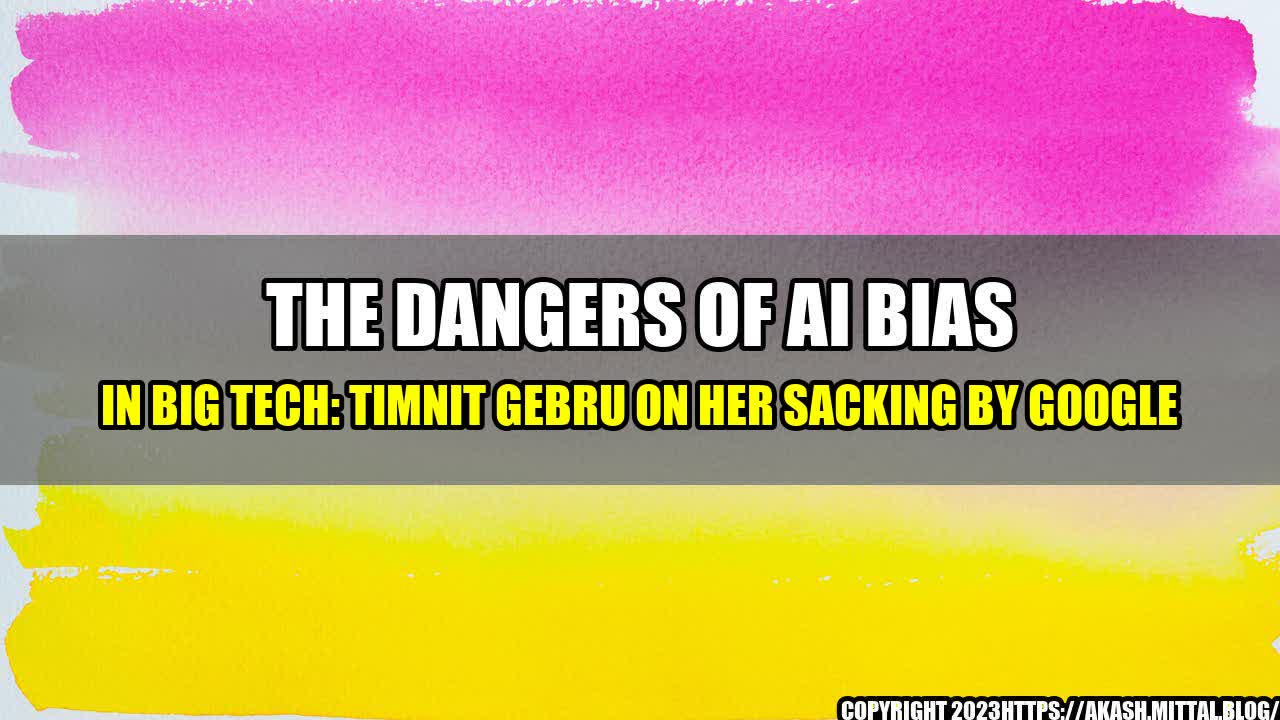It was a moment that changed everything for Timnit Gebru, a world-renowned researcher in computer science and artificial intelligence (AI). She had been working at Google, one of the most prestigious tech companies in the world, for years. Her focus was on making AI more ethical and diverse, so it could serve the needs of everyone, regardless of race, gender, or socio-economic background.
But then, one day, she received an email from her boss, which turned her life upside down. In the email, her boss asked her to retract a paper she co-authored, which criticized the biases of AI language models and their impact on marginalized communities. When Timnit refused to retract the paper, her boss fired her, claiming that she had violated company policies.

This incident ignited a firestorm of controversy in the tech community. Many saw it as a blatant act of censorship and discrimination against a prominent Black woman in tech, who had been fighting for justice and equality in her field. They rallied to her defense, calling for Google to reconsider its decision and to take responsibility for its own biases and prejudices.
Indeed, Timnit's story is just the tip of the iceberg when it comes to the dangers of AI bias in big tech. As more and more companies rely on AI to make decisions that affect our lives, from hiring to healthcare to criminal justice, there is a growing need to ensure that AI is fair, transparent, and accountable.
Quantifiable examples of AI bias
It's not just a theoretical issue. There are many instances of AI bias in real-world settings, which have had serious consequences for individuals and communities. For example:
- In 2018, Amazon scrapped an AI-powered recruitment tool that discriminated against women, because it was trained on male-dominated resumes and job descriptions.
- In 2019, a man in Michigan was wrongfully arrested by facial recognition software, which identified him as a suspect based on his skin color.
- In 2020, Apple's credit card was accused of gender bias, as women were receiving lower credit limits than men with equal financial histories.
These cases illustrate how AI can perpetuate and amplify existing biases and inequalities, rather than mitigate them. They also highlight the need for more diverse and inclusive datasets, algorithms, and teams, which can identify and correct for bias in AI.
Personal anecdotes and case studies
But it's not just about the numbers. It's also about the human stories behind them. For example:
Personal anecdote 1: The Black doctor who was denied treatment
Dr. Tamika Cross, an obstetrician and gynecologist, was on a Delta flight when a passenger nearby became unresponsive. Dr. Cross offered to help, but the flight attendant refused to believe that she was a doctor, and asked for "actual physicians" to come forward. It was only after several white male passengers offered their services that Dr. Cross was allowed to assist. She later wrote about the incident on social media, using the hashtag #whatadoctorlookslike.
Personal anecdote 2: The Indigenous woman who was misdiagnosed
Jessica Dempsey, a Métis scholar, was studying at the University of British Columbia when she was diagnosed with breast cancer. But the biopsy was inconclusive, and she was told that she needed to undergo further testing. However, because of her Indigenous status, she was denied access to the genetic testing that would have provided a clearer diagnosis. She ended up flying to the US to have the testing done, at her own expense. She later wrote about the incident in a scholarly article, using the concept of "colonial algorithms" to describe how colonialism and racism affect medical diagnosis and treatment.
These examples show how AI bias is not just a technical issue, but also a social and political one. They also demonstrate how individuals and communities are fighting back against AI bias, using their own voices and experiences.
Conclusion: Three actions we can take
So, what can we do to address the dangers of AI bias in big tech? Here are three actions we can take:
- Listen to marginalized voices: We need to prioritize the perspectives of those who have been historically excluded from tech, such as women, people of color, Indigenous people, and other underrepresented groups. We need to recognize their expertise, experiences, and insights, and incorporate them into the design and development of AI systems.
- Hold tech companies accountable: We need to demand more transparency, oversight, and regulation of AI systems, to ensure that they are fair, transparent, and accountable. We need to challenge tech companies to be more responsible and responsive to the needs and concerns of their users and stakeholders, and to consider the broader social and ethical implications of their products and services.
- Support critical research: We need to invest in research that challenges the status quo, and that advances more equitable and democratic approaches to AI. We need to support scholars and activists who are working to expose and correct AI bias, and who are developing alternative visions and practices of AI that are grounded in justice and community.
Category: Technology

Curated by Team Akash.Mittal.Blog
Share on Twitter Share on LinkedIn